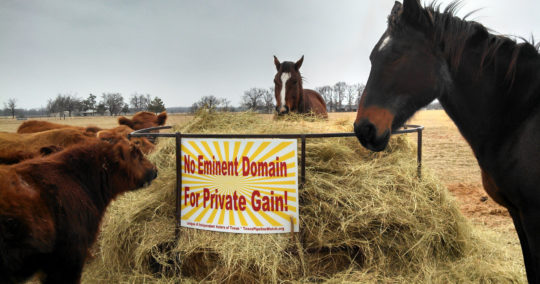

The Ponca Tribe of Nebraska and Yankton Sioux Tribe, along with intervenors including Sierra Club, and the Nebraska Public Service Commission’s (PSC) attorney have submitted appellee briefs in the appeal before the Nebraska Supreme Court of the PSC’s approval of a “Mainline Alternative” route for TransCanada’s proposed Keystone XL pipeline.
All of the new briefs from intervenors sided with the arguments put forth in the landowners’ opening brief filed last month (also embedded below), which challenged the PSC’s authority to approve the “Mainline Alternative” route for KXL.
The Ponca and Yankton Tribes argued in their briefs that the PSC also violated its own rules on intervention, by limiting the two distinct, federally-recognized Tribes’ ability to present evidence individually, and on matters beyond the scope of “social and cultural issues.”
The Ponca Tribe also argued that the PSC applied the incorrect standard to consideration of cultural and historic resources — limiting them to those covered by the National Historic Preservation Act (“NHPA”) — instead of applying Nebraska’s Major Oil Pipeline Siting Act (MOPSA) which requires the PSC to consider historic and cultural resources that are in the public interest of Nebraska, and not simply reiterate federal agency responsibilities.
For example, Keystone XL would undeniably cross the historic Ponca “Trail of Tears,” but because the trail is not in the official National Register of historic places (despite efforts in Nebraska to make this happen), it does not qualify for consideration under NHPA. But, the PSC did not abide by Nebraska’s MOPSA law in this case which clearly sees preservation of the Trail of Tears as in the public interest of Nebraska.
In its brief, Sierra Club continued its due process objection, also joined by Bold, from being lumped together with disparate organizations that hold differing views and objectives into one single “Natural Resources” intervenor group by the PSC. The intervenor groups also continued to argue that KXL poses potential irreversible impacts to Nebraska’s natural resources, that the PSC failed to consider appropriate economic and social impacts, and the PSC erred when it found the proposed pipeline to be in the public interest.
The Public Service Commission, represented by assistant state attorney general Jay Bartel, argued in its brief that the PSC’s approval of the “Mainline Alternative” route complied with state law and was in the public interest, adding that Nebraska will “benefit from the investment and activity that is associated with the pipeline construction and operation.”
Final briefs in the case are due in June, and Oral Arguments in the case are expected to be heard by the Nebraska Supreme Court in the fall of 2018.
Public Service Commission Appellee Brief
Ponca Tribe of Nebraska Appellee Brief



